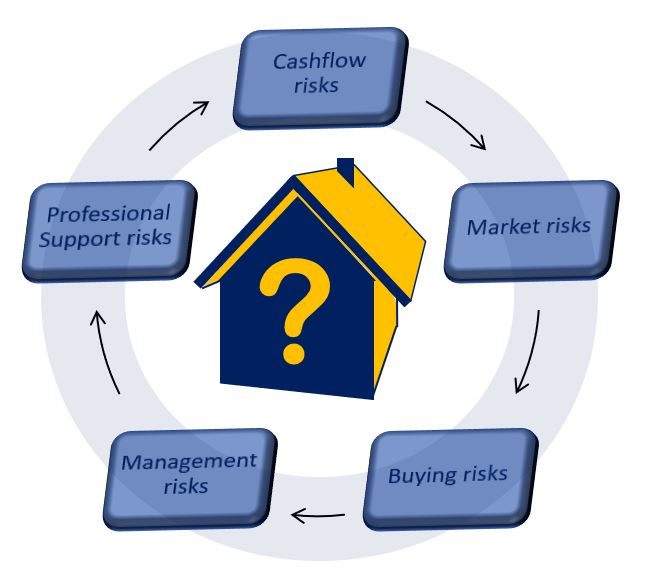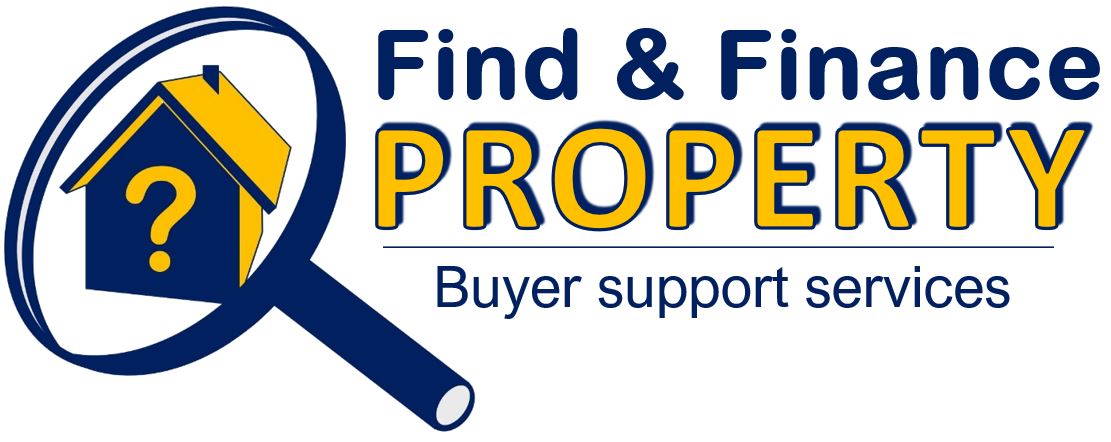Find & FinanceProperty
5 key investment property risks to manage
While buying property is a great vehicle towards achieving financial freedom, there are significant risks to be managed throughout the process from pre-purchase through to disposal. This article outlines five key risk areas associated with property investment, and how to manage them.
Key points
The benefits of compound growth won’t be realised if cashflow issues force an early sale
Understanding property markets, where and when to buy can turbo charge capital growth
Make sure you’ve done your due diligence, so you don’t buy a lemon
Learn the art of effective property management to safeguard and enhance profit potential
Proactively build your own professional support team who work for you and add value

Cashflow risks
Cashflow risk is one of the key risks to consider when buying an investment property. There are many factors that can negatively impact the cash flow of your investment, such as rent arrears, loss of tenant, emergency repairs and other maintenance issues, interest rate rises, and loss of employment.
As a property buyer, it's critical to understand and plan for these risks to realise the capital growth potential of your investment property. Relevant income, property and landlord insurances should be considered.
Pre-purchase cashflow analysis
Undertaking a thorough cashflow analysis prior to purchase is essential for success. So too is contingency planning for potential setbacks and financial buffers. A one-year cashflow analysis prior to purchase is helpful in determining an indicative annual cash position (before and after tax).
Most investment properties will run at a loss, at least for the first few years, and additional funds are needed to compensate for these losses. On top of this casfhlow commitment, a cash buffer (contingency) is required to finance unexpected costs. Issues like the sudden loss of tenant or urgent maintenance requirement that aren't or can't be insured for.
Finance management - the key to healthy cashflow
Because property is a long term investment, how your property finance is structured and managed can make or brake your cashflow health. Educating yourself in relation to property finance options and/or getting expert advice from a trusted mortgage advisor is essential to achieving and maintaining a healthy cashflow.
Undertaking a comprehensive cashflow analysis over several decades can be a powerful tool in planning the capital growth of your asset base and achieving long term financial goals
If cashflow risk is not well managed, an early sale can be forced and significant losses incurred. The opportunity to build capital through compound growth over decades is lost. Read more about managing cashflow risk here.
Market risks
As with any investment, there is inherent risk involved when buying a property. It is crucial to understand market risk and take appropriate measures to minimize your exposure to loss of equity and increase your profit potential
Sub-markets
There are many sub-markets within the property market, which means there’s often a location or type of property that presents better opportunities than others.
Observing historical price data can help you avoid buying at the peak, when a market is over-heated. You can also identify markets that tend to follow others. For example, most property booms will begin in Sydney and/or Melbourne and ripple out across the country. I typically takes one to three years to flow through the broader market, with different timing and impacts on various types of property.
Macro-economic risk
It is also important to understand macro-economic risk that can impact on the broader property market. One of the reasons property is an investment vehicle of choice is that it’s such an effective hedge against inflation.
Understanding the cause and effects of inflation will help you manage risks like rising interest rates and keep you ahead of the crowd. This is especially important should the economic house of cards come tumbling down, resulting in potentially devastating deflation.
Understanding how economies are impacted by the rise and fall of world powers will also inform a savvy property buyer. Adjustments can be made to leverage (LVR) and liquidity (cashflow) to hedge against macro-economic impacts. Read more about various market risks here.
Buying risk
Buyer beware
Selling agents are employed by owners to get the highest possible price for their property. The onus is largely on the buyer to identify an issues with the property that could impact on the value of the property.
Don't assume that sellers will disclose all material facts that might imact on the value of a property, even if they are legally required to do so. The seller is often ignorant of the law and may not be adequately informed and/or held to account by the selling agent. You don't want to end up pursuing compensation in court for the seller's failure to disclose material facts.
Due diligence checks on sales of similar properties in the area, inspections, legals, and amenity issues will help ensure you don't pay too much.

Prepare ahead of buying an investment property
Well before you get to buying stage, your planning and research would have identified all the costs involved in buying property. These include stamp duty, conveyancing fees, inspections, and so on. If this wasn’t done, you may well be tempted to skimp on inspections, for example which could be a very costly mistake.
No matter where you're buying property in Australia, the onus is on the buyer to exercise due diligence in understanding what is being bought, warts and all. It’s too late after settlement to take up issues with the owner. In fact, if the contract is skewed in favour of the vendor (seller), you may even lose opportunity to pull out of the sale during the contract period without losing your deposit. This can happen even if an inspection identifies a leaky pipe under the house, termites, or title complications. It pays to get specialists working for youwhen so much is at stake. Just who you need help from can vary widely, depending on an individual’s own knowledge and skills.
Property management risks
Before buying a property, you would have budgeted based on informed assumptions about maintenance costs, council rates, interest rates, and (for an investment property) vacancy rates. Ongoing management of tenants, and maintenance can make a big difference to your cashflow, which can impact on how quickly you can establish a solid asset base for passive income.
Budget for maintenance
We recommend that any property you own is kept in good repair, which costs money. As a rule of thumb, a minimum budget of 1%-2% of the purchase price per year should be anticipated for ongoing property maintenance costs. The exact allowance will depend on the type of property, it’s use, and building materials.
Plan to add value
Selection of a professional, competent and efficient property manager is a key element to successful management of an investment property. They will have integrated systems, software, and processes to support their significant experience. They will be good with people, and work harmoniously with your tenants where possible; and play with a hard ball when required.
Recruit a professional property manager
Selection of a professional, competent and efficient property manager is a key element to successful management of an investment property. They will have integrated systems, software, and processes to support their significant experience. They will be good with people, and work harmoniously with your tenants where possible; and play with a hard ball when required.
Professional services risk
Often the first professional a property buyer encounters is a sales agent. Beware!
There are many very decent sales agents in the industry, and some of them genuinely helpful to buyers. However, they are not working on your behalf. We're not necessarily advocating for buyers agents here, but the important thing is to understand how the industry works, and to be on your guard.
Build your own property investment team
A sales agent or downstream professional may recommend various professional services to assist you (a mortgage advisor for property finance, legal support/conveyancing, inspectors, and so on). You may may find yourself engaging them in a hurry as the process requires. Alternatively, as part of your planning process, you could intentionally and deliberately build your own team of professionals. These will be part of your team who you are willing to trust with one of the largest investments you’re ever likely to make. Taking this initiative ahead of time will help reduce the stress on you during a time that can be quite stressful for most people.
Quality professionals from at least 10 different specialist areas from mortgage broker to tax accountants and quantity surveyors can make a material difference to your wealth building potential over the long term. Read more about who can help you with what here.
Conclusion
All of the above real estate investment risks can be covered in a comprehensive, sustainable property investment plan, even before you start looking for a property. Developing a plan will give you confidence that you know exactly what you’re doing, and that you have the right support lined up for when you’re ready to buy. In fact the planning phase of any venture provides the opportunity to have a greater impact on the outcome than any future phase.
Manage your risk
In other words, if you get the planning right, and execute the plan, it can make a bigger difference to your journey than any other process or element along the way. That is why Find & Finance Property is committed to empowering and equipping property buyers of all kinds to educate themselves and develop and execute a plan. A well-developed, property investment plan is also an excellent ally when seeking finance. Lenders can see that you know what you’re doing, which means less risk for you, and therefore, less risk for them.
A more detailed discussion on the various risk areas is available in the following articles:-

Find & Finance Property
Find & Finance Property exists to support property buyers through education and innovative tools. It is our mission to equip our customers and clients to understand and manage risk and invest with confidence.
NEWSLETTER
Manage your risk - invest with confidence
